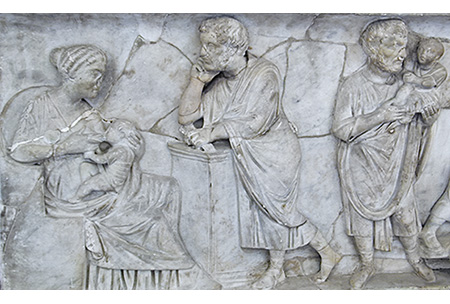 A mother nurses her infant |
Columella wrote the De Re Rustica in the mid 1st
century CE. It consists of twelve books of advice on running an agricultural
estate. Chapter 8 is devoted to the assignment of work to slaves and how to
best care for them in order to maintain and increase their productivity. In
this selection he argues that since a slave woman’s “work” in
bearing children profits her master, she should be rewarded for her fecundity.
Varro, a contemporary who also wrote a treatise on the running of an estate,
had a different opinion. He recommended that only vilici be rewarded
with privileges, with peculium (a slave’s savings with which he
might buy his freedom) and with female slave companions; Varro was apparently
unconcerned with how a slave woman might perceive this use of her body. Columella's description of the duties of the vilica may be found in the World of Work.
| Feminis quoque fecundioribus, quarum in subole certus numerus honorari debet, |
| otium nonnumquam et libertatem dedimus, cum plures natos educassent. |
| Nam cui tres erant filii, vacatio, cui plures libertas quoque contingebat. |
| Haec et iustitia et cura patris familias multum confert augendo patrimonio. |
Click on the underlined words for translation aids and commentary, which will appear in a small window. Close this small window after each use.